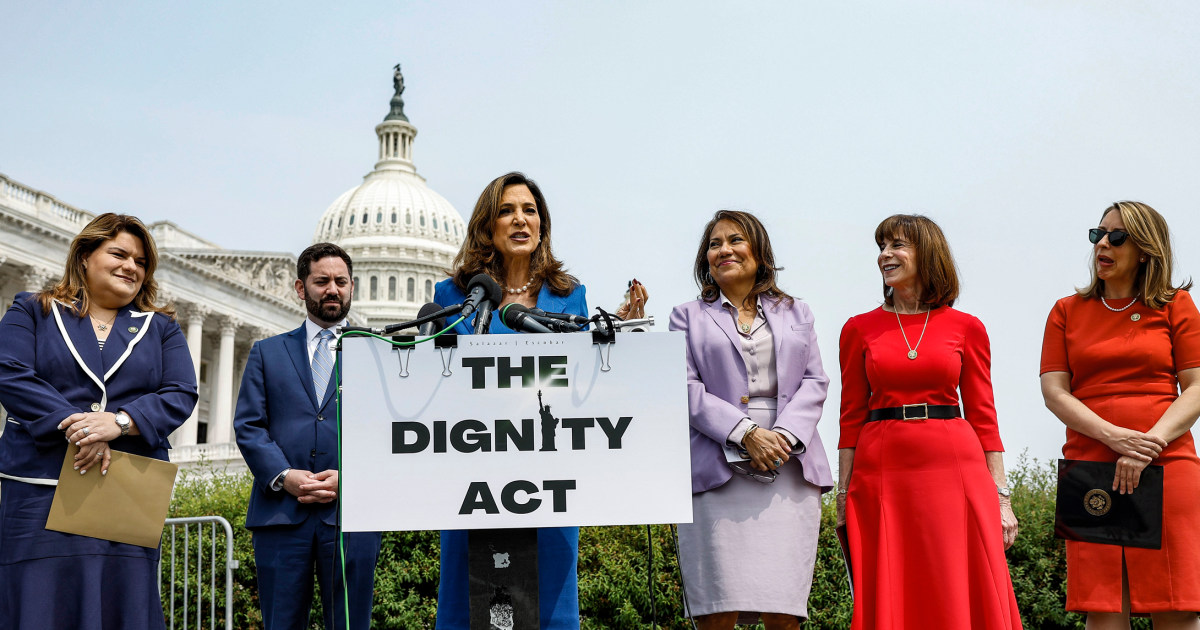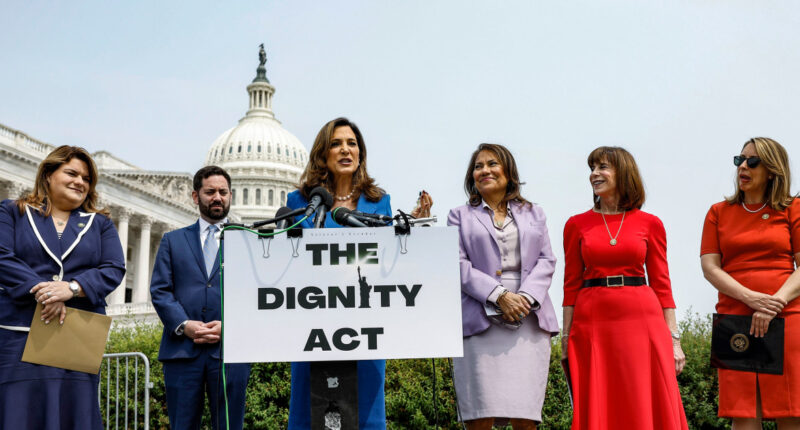
Two Latina congresswoman proposed a bipartisan immigration bill Tuesday that would create a 12-year, two-part path to legal status and would require the border first be declared secure before anyone on the path is granted legal status.
The congresswomen, Rep. María Salazar, R-Fla., and Rep. Veronica Escobar, D-Texas, call their legislation “The Dignity Act.”
They said it would allow people in the country illegally to be able to work and not be deported. It would speed up the asylum process and detain asylum seekers who arrive at the southern border at one of five “humanitarian campuses” where they will stay until their case is decided. It also would dock the pay of people without permanent legal status to fund border infrastructure.
Salazar said the measure should not be confused with the amnesty law signed by former President Ronald Reagan in 1986. The bill has tougher measures and higher penalties than a Republican border security bill approved by the House on May 11.
“I don’t want anyone to confuse amnesty with dignity,” Salazar said in a Capitol Hill news conference. “This is not amnesty. Amnesty is what the undocumented have right now and have had for 30 years. Free roads, free schools and free hospitals. In the Dignity law everyone pays for their ride.”
Salazar, who is Cuban American, said the bill’s objective is to “bring dignity” to Border Patrol agents who she said are “overworked and underpaid,” the business community in need of workers and to the millions and millions of people “who are invisible to most Americans, who are doing the jobs others are unwilling to do.”
The legislation was proposed a little more than a week after the Biden administration ended use of a health law, Title 42, imposed during the pandemic. Its projected end brought more people to the border to seek asylum or other entry, but not as many as had been projected.
Many of the people who have arrived, including those processed by Border Patrol, were housed in El Paso before going on to the rest of the country. The city saw hundreds of people sleeping on their streets in the December cold and again in recent months.
“Communities like my own in El Paso, Texas, communities along the southern border and now even communities far away from the southern border have some impact from congressional inaction,” Escobar, who is Mexican American, said.
Congress has failed repeatedly to pass legislation that modernizes its immigration laws and keeps up with the shifting migration realities.
In a statement, Vanessa Cárdenas, executive director of America’s Voice, an immigrant advocacy group that has supported immigration reform, called the legislation an important alternative to the House GOP bill. The Democrat-led Senate isn’t likely to take up the House Republican bill, which focuses mostly on enforcement.
But she questioned whether the Salazar-Escobar bill stood much chance of advancing, saying the House “seems to prefer the politics of a broken immigration system over real solutions.”
Specifically, some of the provisions in the Salazar-Escobar bill are:
— Requires the General Accounting Office to certify that for a full year, Border Patrol has detected and apprehended 90% of people crossing the border illegally or trying to before allowing immigrants to obtain permanent legal status.
— Allows people in the country for five years without legal status and with no criminal record to work and be protected from deportation for seven years through the “Dignity Program.”
— Those in the “Dignity Program” will have a 1.5% “dignity levy” withheld from their paycheck, in addition to taxes they pay. They also will pay a fee of $5,000.
— Allow those who complete the Dignity Program to obtain “Dignity status,” an additional five years to work and remain in the U.S. The status can be renewed indefinitely.
— Allow those who complete the Dignity Program to enter the five-year Redemption program, during which they learn English, U.S. civics, perform community service or pay another $5,000. If completed successfully they earn legal permanent residency status, the stepping stone to citizenship. The bill calls for participants to go to the “back of the line.”
— Speed up the asylum process to a total of 60 days.
— Create immediate protected status and a streamlined path for immigrants who arrived or came to the country as children, referred to as Dreamers in the bill, or those with Temporary Protected Status, a type of protection from deportation granted by the president for people for natives of countries that have experienced natural disasters, conflict or other upheaval.
Source: | This article originally belongs to Nbcnews.com










